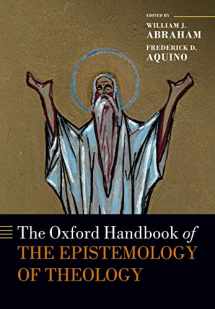
The Oxford Handbook of the Epistemology of Theology (Oxford Handbooks)
Book details
Summary
Description
The Oxford Handbook of the Epistemology of Theology brings together leading scholars in the fields of theology and epistemology to examine and articulate what can be categorized as appropriate epistemic evaluation in theology. Part one focuses on some of the epistemic concepts that have been traditionally employed in theology such as knowledge of God, revelation and scripture, reason and faith, experience, and tradition. This section also considers concepts that have not received sufficient epistemological attention in theology, such as saints, authority, ecclesial practices, spiritual formation, and discernment. Part two concentrates on epistemic concepts that have received significant attention in contemporary epistemology and can be related to theology such as understanding, wisdom, testimony, virtue, evidence, foundationalism, realism/antirealism, scepticism, and disagreement. Part three offers examples from key figures in the Christian tradition and investigates the relevant
epistemological issues and insights in these writers, as well as recognizing the challenges of connecting insights from contemporary epistemology with the subject of theology proper, namely, God. Part four centres on five emerging areas that warrant further epistemological consideration: liberation theology, continental philosophy, modern orthodox writers, feminism, and Pentecostalism.
This authoritative collection explores how the various topics, figures, and emerging conversations can be reconceived and addressed in light of recent developments in epistemology. Each chapter provides an analysis of the crucial moves, positions, and debates, while also identifying relevant epistemic considerations. This handbook fulfils the need for the development of this new conversation that will take its natural place in the intersection of theology and epistemology. It links the fields of theology and epistemology in robust, meaningful, and significant ways.


We would LOVE it if you could help us and other readers by reviewing the book
Book review



